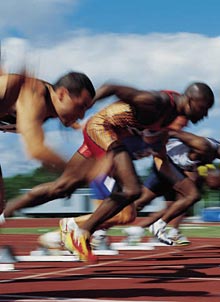
|  |  |  News Around the Republic of Mexico | June 2009 News Around the Republic of Mexico | June 2009  
Run to Mexico?
 Alexis Okeowo - Newsweek Alexis Okeowo - Newsweek
go to original
June 30, 2009


| | More than 200 runners from Africa, South America and Eastern Europe have made Mexico's central mountains their home in recent years. |  |
A growing number of international runners are leaving their homelands for an unlikely destination: Mexico.

Though the U.S. still boasts more foreign transplants, Mexico's high altitude, easier visa process and cheaper cost of living are luring some of the sport's leading figures, including Kenyans Isaac Kimaiyo, Lazarus Nyakeraka and Patrick Nthiwa. Mexico also taxes race winnings by 14 percent, compared with 33 percent in the U.S., which Nyakeraka says makes it a "better option" for runners who send race earnings to family back home.

The runners are coming despite a disastrous drug war that is keeping tourists away and crippling foreign investment. So far, more than 200 runners from Africa, South America and Eastern Europe have made Mexico's central mountains their home in recent years. Each athlete is represented by a private company that spends as much as $50,000 a year on travel arrangements for them, according to athletic manager Francisco Ibarra. The Mexican government, in turn, facilitates the relocation and gives recruiters free rein to move athletes to the country. "We want to maintain a population of highly competent foreign athletes in order to encourage our own Mexican athletes to advance to the next level," says Luciano Ramirez of the independent Mexican Athletics Federation. The runners also compete with Mexico's support in races abroad.

Yet even as Mexico tries to package itself as a sporting suburb of the U.S., it's facing one major drawback: racism. African runners complain of constant taunts from fans upset that the newcomers are beating out homegrown favorites. Coaches have complained to officials, to no avail. Last year Kenyan runners won 85 percent of the country's domestic long-distance races. But organizers have started limiting the number of prizes that Africans can win, regardless of how well they place. In races abroad, all of Mexico's runners are equal, but at home, it seems that some are more equal than others. |

 |
|  |



